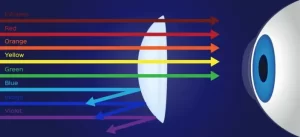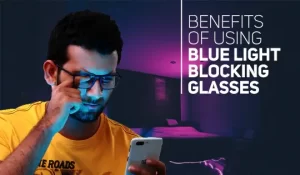In today’s digital age, our eyes are constantly exposed to blue light emitted by screens. To combat potential eye strain and sleep disruption, many people have turned to blue light filtering lenses. But do they really work? Let’s delve into the facts and uncover whether investing in blue light filtering lenses is truly worth it for your eye health and overall well-being.
What is Blue Light?
Blue light is a high-energy visible (HEV) light with wavelengths between 380 and 500 nanometers. It is naturally emitted by the sun, but can also be found in digital devices such as smartphones, tablets, computers, and LED lighting. Exposure to blue light has been linked to sleep disturbances, digital eye strain, and potentially long-term damage to the eyes.
How Blue Light Filtering Lenses Work

Absorption
Blue light filtering lenses are designed to absorb a portion of the blue light spectrum. They use specific pigments or coatings that absorb high-energy blue light wavelengths while allowing other visible light to pass through.
Reflection
Some lenses are coated with a thin layer of material that reflects blue light away from the eyes. This layer reduces the amount of blue light that enters the eye without significantly affecting the transmission of other visible light wavelengths.
The Benefits of Blue Light Filtering Lenses

Reduced Eye Strain
One of the most immediate benefits of using the lenses is reduced eye strain. Digital devices emit high levels of blue light, which can lead to discomfort, dryness, and irritation after prolonged use. It can help alleviate these symptoms and make screen time more comfortable.
Improved Sleep
Exposure to blue light in the evenings can disrupt our natural sleep patterns by suppressing the production of melatonin, a hormone that regulates sleep. It can help minimize this effect and improve sleep quality by reducing exposure to blue light from screens and other sources.
Long-term Eye Health
There is evidence to suggest that prolonged exposure to blue light may contribute to age-related macular degeneration (AMD) and other retinal damage. By filtering out some of this harmful blue light, they may help preserve long-term eye health.
Are they Worth It?
Pros
- Reduced eye strain and discomfort
- Improved sleep quality
- Potential long-term benefits for eye health
Cons
- Additional cost for lenses or coatings
- Slight color distortion due to the filtering process
Ultimately, the decision to invest in blue light filtering lenses depends on your individual needs and preferences. If you spend a significant amount of time using digital devices, especially in the evening, and experience eye strain or sleep disturbances, they may be a worthwhile investment. It’s important to weigh the potential benefits against the additional cost and any minor color distortion that may occur.
Conclusion
The science behind blue light filtering lenses is compelling, and these lenses have been shown to offer a range of benefits, including reduced eye strain, improved sleep, and potential long-term eye health protection. However, it’s essential to consider the added cost and any possible color distortion when deciding whether they are right for you. Consult with your eye care professional to determine the best option based on your specific needs and lifestyle.

